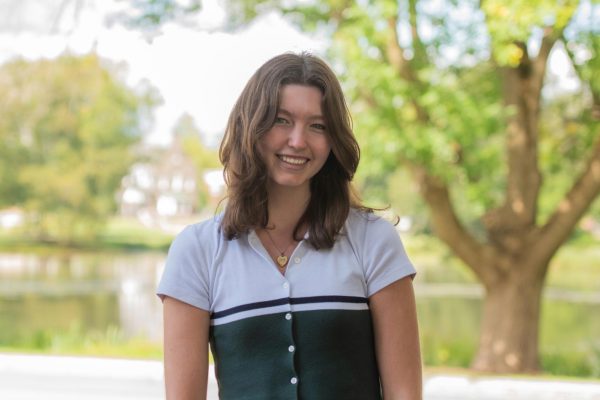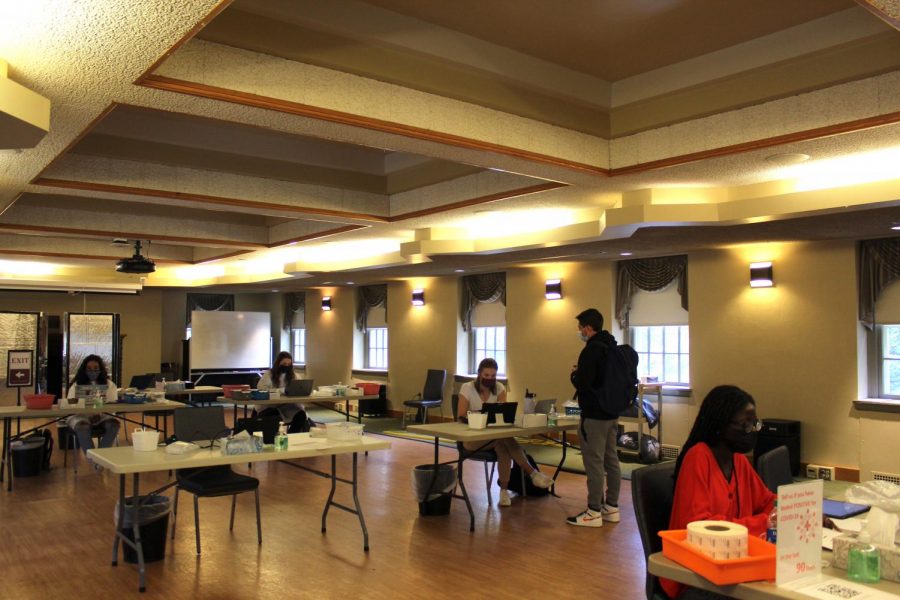Optional Testing Available as Students Return from Fall Break, Ahead of Family Weekend
TRAVELED & TESTED: COVID-19 testing is available to students in the Clark Room in the Hall of Presidents after fall break travel.
In preparation for students to leave campus for fall break, the Task Force on Reopening sent an email on Oct. 4 outlining guidelines for travel, testing and social gatherings upon return to campus. The Task Force urged students to travel safely and take advantage of optional testing prior to and after the break, with the expectation that those with COVID-19 symptoms would take the personal responsibility of getting tested. In a more recent email sent on Oct. 12, the Task Force added that there would be no University-approved social events on the weekend following the break, from Oct. 15 to 17.
First-year student Avery Brundige said she felt confident in the fact that both she and her peers were traveling safely when they visited home or other destinations during the break.
“I went home for fall break, but I felt relatively safe since I’m vaccinated and was masked while in the airport and on the plane. I do think travel comes with a risk, but I feel like students have been really smart about masking and social distancing, and I trust Colgate’s community to do our best to keep each other safe,” Brundige said.
While traveling safely is a major component to avoiding the spread of the virus, many students have taken steps to protect the community once back on campus. In the testing tent outside James C. Colgate Hall, the University offered testing by appointment for students on Wednesday, Thursday and Friday of the week students returned. Although the testing was not required as it was for move-in and orientation in August, many students still took the initiative to test, whether they had COVID-19 symptoms or were just cautious following travel and exposure. In response to a large turnout of students getting tested, President Brian Casey expressed his excitement and satisfaction with how the community is responding to post-fall break guidelines.
“Our posture has been that [COVID-19] is endemic now, and everyone needs to manage their sense of safety, so we wanted to offer pre-departure and [post-return tests], and a large number of students […] have availed themselves on tests going away and tests coming back. I think a couple hundred [students] took tests, so I’m extremely proud,” Casey said.
With the decision to make testing optional and available by appointment, the University and Task Force are turning the majority of the responsibility over to students. Department Chair and Professor of Economics Nicole Simpson said she agreed with the decision to make testing optional, expressing her trust in both the Task Force and Colgate students.
“I’m fairly laid-back about testing […] for everyone who has been vaccinated, I feel like we shouldn’t have to necessarily undergo mandatory testing. I think this is very different from last year, when the majority of the population on campus did not have vaccines so we had to test. Given that nearly everyone is vaccinated and we know people are following the rules with masks and calling each other out on it, I think it seems to be right to allow students to decide whether they want to be tested following the break,” Simpson said.
In addition to post-fall break guidelines, the Task Force stated that, in accordance with the HERO Act, Colgate’s campus will continue to wear masks indoors for the month of October. On Sept. 30th, Commissioner of the New York State Department of Health Howard A. Zucker, M.D., J.D., released an official statement about the Act and mandatory indoor masking in the future.
“The Centers for Disease Control and Prevention (CDC) has identified the level of transmission of [COVID-19] as ‘substantial’ or ‘high.’ I hereby continue [the requirement of masking in indoor public spaces] until Oct. 31, 2021, at which point I will review the level of transmission of COVID-19 in New York State and determine whether to continue this designation,” Zucker said in his statement.
As a result, the Task Force on Reopening is determining their amendments to campus social and masking guidelines based on what the New York State Department of Health concludes about Madison County on Oct. 31. While Colgate’s student body has no active cases as of Oct. 19, the University must take into account the infection rates of the county and the town of Hamilton. According to the Health Analytics Dashboard, Madison County’s CDC Transmission Status remains in the ‘high’ threshold, and as of Oct. 19, the Community Memorial Hospital has a “high” alert, signifying a deficiency in beds and staffing.
Since Colgate plays a large role in the Hamilton community, where many students, staff and faculty live, support businesses and interact with members of Madison County, the transmission rates of Madison County may influence the implementation of necessary campus safety policies. As a resident of Hamilton, Simpson has witnessed the high case rates and believes that due to the nature of the region, Madison County is fundamentally susceptible to staying in this high threshold.
“It’s a small county. We’re not densely populated, so it doesn’t take much. Just a few small groups of cases throughout the county can easily get that number to where the hospitals start feeling burdened. Very quickly, our hospitals can be overburdened with just very small numbers of cases. We’re probably going to stay there, given we just don’t have that many beds and hospitals outside major metro areas,” Simpson said.
Since the status of the county and Colgate’s indoor masking policy remains unchanged for the time being, the University and the Task Force are turning their attention towards ensuring a seamless parents’ weekend, taking place from Oct. 22 to 24. Considering that there are no reported active student cases following fall break, family weekend will continue to take place as planned. To prevent an outbreak after students welcome their relatives to campus, certain restrictions are in place regarding vaccination proof and social distancing during meals. Guests are encouraged to have a New York State Excelsior Pass, a digital form of a vaccination card that can verify vaccination status by scanning their phone.
“[Friday’s dinner] is going to be a casual barbeque feeding 3,000 people, so it’s going to be outdoors […] We’re just having Excelsior passes everywhere and [guests] get a band. There are a thousand details every hour and we’re just praying for good weather,” Casey said.

Rio Lacey is a junior from San Diego, CA concentrating in economics with a minor in political science. She has previously served as a staff writer for...











